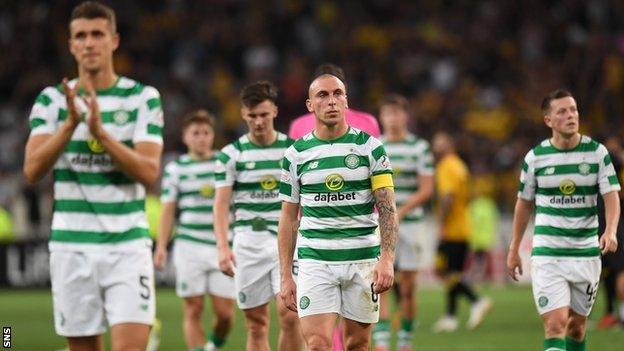Celtic: How much will Champions League defeat by AEK Athens cost?
- Published

Celtic would have had to negotiate an extra qualifying round to reach the Champions League this season
Reaching the Champions League group stage in Brendan Rodgers' first two seasons in charge has generated about £60m for Celtic in prize money, broadcast revenues and gate receipts.
Finding a way past AEK Athens this week, then Hungarian side MOL Vidi in the play-off round, could have taken that figure in excess of £100m.
But instead of sharing this season's enhanced £1.82bn Champions League prize pot, Celtic stand only to claim a slice of the £455m to be distributed to clubs in the Europa League.
So how does that disparity manifest itself? And what will Celtic do about it?
Big drop in prize money
Just for reaching the Champions League group stage, Celtic would have been guaranteed £13.6m.
Instead, should they progress past Latvia's Spartaks Jurmala or Suduva of Lithuania in the Europa League play-offs, they will pick up a comparatively paltry £2.6m.
That is £11m gone already. But the haemorrhaging does not stop there.
As the table below shows, the difference in money received for picking up points in the respective competitions is stark. So, too, is the bounty on offer for reaching the knockout stages.
Then there is Celtic's share of the coefficent ranking pot. That would have been at least another £1.1m, based on where the Scottish champions would have ranked among the 32 teams in the groups.
In the Europa League, that payment would range from £63,700 to £3.05m - but the latter would only be claimed if Celtic were the highest-ranked team in the competition.
Television revenue falls
Celtic earned a reported £13.4m, external from television rights last season, with any Scottish clubs reaching the group stage entitled to 10% of the total paid to broadcast matches involving British clubs.
Last term, BT Sport parted with £134m for that privilege - a sum inflated by Liverpool reaching the final.
That bounty has gone now, too, to be potentially replaced with a far less substantial payment from the Europa League - and one that may need to be split with Rangers and Hibernian, should they qualify.
BT Sport also holds the rights for the second-tier competition, but it remains unclear how big the market pool will be for that.
Will they sell to make up the shortfall?
Possibly. Celtic's net spend this summer is negligible, with the club record £8m signing of striker Odsonne Eduoard from Paris St-Germain offset by the sales of midfielder Stuart Armstrong to Southampton and defender Erik Sviatchenko to FC Midtjylland.
Another centre-back, Dedryck Boyata, could also leave after failing to travel to Athens this week amid suggestions he was refusing to play in an attempt to force a move.
English Premier League side Fulham had a bid - reported to be worth £9m - rejected last week. And although England's transfer window has now closed, there has also been apparent interest, external from Sevilla.
Furthermore, reports this week have suggested midfielder Olivier Ntcham - a £4.5m signing from Manchester City - is a target for Porto and Marseille.
'It's about the prestige' - analysis
Former Celtic player and assistant manager John Collins on BBC Radio 5 live
These amounts might not sound a lot to people in England, but for Scottish football it's a huge amount of money. But, for me, the most important thing is for prestige and excitement for the supporters.
Celtic fans love the Champions League and being in with the big boys - in recent years, Barcelona, Bayern Munich, Manchester City - and the atmosphere is sensational. It means so much to them to qualify for the Champions League, but it's difficult - four qualifying rounds.